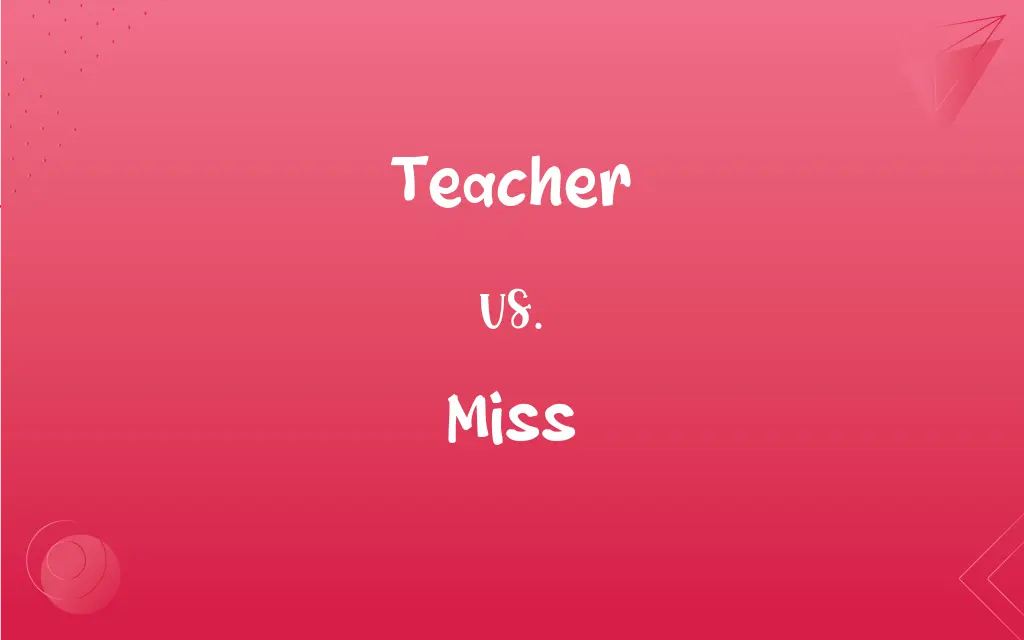Teacher vs. Miss: What's the Difference?
Edited by Aimie Carlson || By Janet White || Updated on October 8, 2023
A "Teacher" is someone who instructs or educates, while "Miss" is a form of address for an unmarried woman or used before a girl's name.

Key Differences
Teacher and Miss are terms that serve very different functions within the English language. A Teacher refers to an individual, regardless of gender, who imparts knowledge or instructs in a subject or skill. This term emphasizes the profession or role of educating and guiding others. On the other hand, Miss is traditionally a title or form of address used for an unmarried woman, emphasizing her marital status, or it can simply be used before a girl's name.
It's worth noting that while Teacher focuses on the vocation of educating and can be used universally for individuals of this profession, Miss has connotations tied to cultural and societal norms related to gender and marital status. In many educational settings, especially for younger students, female teachers might be addressed as "Miss," but this does not negate their primary identity as a Teacher.
Furthermore, while Teacher is a neutral term, purely denoting the profession and devoid of any gender or marital status indications, Miss specifically refers to females. In some school settings, especially in the past, students might have referred to their female teachers as Miss followed by their surname, but this practice is less common now, particularly in more formal or higher educational settings.
In contemporary usage, while the term Teacher remains consistent in meaning, the usage of Miss as a title has seen shifts. In some contexts, especially in professional settings, women might prefer other titles like "Ms.," which doesn't indicate marital status. However, Miss is still widely used, especially in informal settings or when addressing younger girls.
Comparison Chart
Primary Definition
An individual who educates or instructs
A title for an unmarried woman
ADVERTISEMENT
Gender Specific
No
Yes (Female)
Indication of Profession
Yes (Education/Teaching)
No
Marital Status Indication
No
Yes (Traditionally unmarried)
Context of Usage
Educational settings, universally
Formal address, in schools, informal use
Teacher and Miss Definitions
Teacher
An individual who imparts knowledge or skills.
The Teacher prepared a lesson on the solar system.
ADVERTISEMENT
Miss
An informal title often used in schools for female teachers by students.
Miss Smith teaches us mathematics.
Teacher
A professional employed in an educational institution.
Every Teacher in the school attended the meeting.
Miss
A term indicating the absence or lack of something.
Without her glasses, she had a miss in her aim.
Teacher
Someone who guides or mentors in a particular field.
She's not just a coach; she's also a Teacher who ensures we understand the game's strategies.
Miss
A title in pageants for unmarried contestants.
She was crowned Miss Universe.
Teacher
A role model or leader in a community or group.
The spiritual Teacher had followers from around the world.
Miss
To fail to hit, reach, catch, or otherwise make contact with
He swung at and missed the ball. The winger missed the pass. The ball missed the basket.
Teacher
One who teaches, especially one hired to teach.
Miss
To be too late for or fail to meet (a train, for example).
Teacher
A person who teaches, especially one employed in a school.
Miss
To fail to perceive, experience, or understand
I missed my favorite TV show last night. You completely missed the point of the film.
Teacher
The index finger; the forefinger.
Miss
To fail to accomplish or achieve
Just missed setting a new record.
Teacher
An indication; a lesson.
Miss
To fail to attend or perform
Never missed a day of work.
Teacher
(Mormonism) The second highest office in the Aaronic priesthood, held by priesthood holders of at least the age of 14.
Miss
To fail to answer correctly
Missed three questions on the test.
Teacher
One who teaches or instructs; one whose business or occupation is to instruct others; an instructor; a tutor.
Miss
To fail to benefit from; let slip
Miss a chance.
Teacher
One who instructs others in religion; a preacher; a minister of the gospel; sometimes, one who preaches without regular ordination.
The teachers in all the churches assembled.
Miss
To escape or avoid
We took a different way and missed the traffic jam.
Teacher
A person whose occupation is teaching
Miss
To discover the absence or loss of
I missed my book after getting off the bus.
Teacher
A personified abstraction that teaches;
Books were his teachers
Experience is a demanding teacher
Miss
To be without; lack
A cart that is missing a wheel.
Teacher
An individual who influences and shapes the understanding of others.
Life is the best Teacher; it gives the test first and the lesson afterward.
Miss
To feel the lack or loss of
Do you miss your family?.
Miss
To fail to hit or otherwise make contact with something
Took a shot near the goal and missed.
Miss
To be unsuccessful; fail
A money-making scheme that can't miss.
Miss
To misfire, as an internal-combustion engine.
Miss
A failure to hit or make contact with something.
Miss
A failure to be successful
The new movie was a miss.
Miss
The misfiring of an engine.
Miss
Miss Used as a courtesy title before the surname or full name of a girl or single woman.
Miss
Used as a form of polite address for a girl or young woman
I beg your pardon, miss.
Miss
A young unmarried woman.
Miss
Miss Used in informal titles for a young woman to indicate the epitomizing of an attribute or activity
Miss Organization.
Miss Opera.
Miss
Mis·ses A series of clothing sizes for women and girls of average height and proportions.
Miss
(ambitransitive) To fail to hit.
I missed the target.
I tried to kick the ball, but missed.
Miss
(transitive) To fail to achieve or attain.
To miss an opportunity
Miss
(transitive) To avoid; to escape.
The car just missed hitting a passer-by.
Miss
(transitive) To become aware of the loss or absence of; to feel the want or need of, sometimes with regret.
I miss you! Come home soon!
Miss
(transitive) To fail to understand;
Miss the joke
Miss
(transitive) To fail to notice; to have a shortcoming of perception; overlook.
So I'm just going over my early notes, see if I missed anything.
Miss
(transitive) To fail to attend.
Joe missed the meeting this morning.
Miss
(transitive) To be late for something (a means of transportation, a deadline, etc.).
I missed the plane!
Miss
(transitive) To be wanting; to lack something that should be present.
The car is missing essential features.
Miss
To spare someone of something unwanted or undesirable.
Miss me with that nonsense!
Miss
To fail to help the hand of a player.
Player A: J7. Player B: Q6. Table: 283. The flop missed both players!
Miss
(sports) To fail to score (a goal).
Miss
To go wrong; to err.
Miss
To be absent, deficient, or wanting.
Miss
A failure to hit.
Miss
A failure to obtain or accomplish.
Miss
An act of avoidance give}}
I think I’ll give the meeting a miss.
Miss
(computing) The situation where an item is not found in a cache and therefore needs to be explicitly loaded.
Miss
A title of respect for a young woman (usually unmarried) with or without a name used.
You may sit here, miss.
You may sit here, Miss Jones.
Miss
An unmarried woman; a girl.
Miss
A kept woman; a mistress.
Miss
(card games) In the game of three-card loo, an extra hand, dealt on the table, which may be substituted for the hand dealt to a player.
Miss
A title of courtesy prefixed to the name of a girl or a woman who has not been married. See Mistress, 5.
Miss
A young unmarried woman or a girl; as, she is a miss of sixteen.
Gay vanity, with smiles and kisses,Was busy 'mongst the maids and misses.
Miss
A kept mistress. See Mistress, 4.
Miss
In the game of three-card loo, an extra hand, dealt on the table, which may be substituted for the hand dealt to a player.
Miss
The act of missing; failure to hit, reach, find, obtain, etc.
Miss
Loss; want; felt absence.
There will be no great miss of those which are lost.
Miss
Mistake; error; fault.
He did without any great miss in the hardest points of grammar.
Miss
Harm from mistake.
Miss
To fail of hitting, reaching, getting, finding, seeing, hearing, etc.; as, to miss the mark one shoots at; to miss the train by being late; to miss opportunites of getting knowledge; to miss the point or meaning of something said.
When a man misses his great end, happiness, he will acknowledge he judged not right.
Miss
To omit; to fail to have or to do; to get without; to dispense with; - now seldom applied to persons.
She would never miss, one day,A walk so fine, a sight so gay.
We cannot miss him; he does make our fire,Fetch in our wood.
Miss
To discover the absence or omission of; to feel the want of; to mourn the loss of; to want; as, to miss an absent loved one.
Neither missed we anything . . . Nothing was missed of all that pertained unto him.
What by me thou hast lost, thou least shalt miss.
Miss
To fail to hit; to fly wide; to deviate from the true direction.
Men observe when things hit, and not when they miss.
Flying bullets now,To execute his rage, appear too slow;They miss, or sweep but common souls away.
Miss
To fail to obtain, learn, or find; - with of.
Upon the least reflection, we can not miss of them.
Miss
To go wrong; to err.
Amongst the angels, a whole legionOf wicked sprites did fall from happy bliss;What wonder then if one, of women all, did miss?
Miss
To be absent, deficient, or wanting.
What here shall miss, our toil shall strive to mend.
Miss
A young woman;
A young lady of 18
Miss
A failure to hit (or meet or find etc)
Miss
Fail to perceive or to catch with the senses or the mind;
I missed that remark
She missed his point
We lost part of what he said
Miss
Feel or suffer from the lack of;
He misses his mother
Miss
Fail to attend an event or activity;
I missed the concert
He missed school for a week
Miss
Leave undone or leave out;
How could I miss that typo?
The workers on the conveyor belt miss one out of ten
Miss
Fail to reach or get to;
She missed her train
Miss
Be without;
This soup lacks salt
There is something missing in my jewellery box!
Miss
Fail to reach;
The arrow missed the target
Miss
Be absent;
The child had been missing for a week
Miss
Fail to experience;
Fortunately, I missed the hurricane
Miss
A title used before the surname or full name of an unmarried woman or girl.
May I speak with Miss Johnson?
Miss
A form of address for a young girl.
Hello, Miss! How was your day at school?
FAQs
Does "Miss" always indicate marital status?
Traditionally, "Miss" indicates an unmarried status, but its usage can be more general, especially for younger females.
Can a male be referred to as a Teacher?
Yes, a "Teacher" can be of any gender.
Is "Miss" specific to any gender?
Yes, "Miss" is specifically used for females.
What's the difference between "Miss" and "Ms."?
"Miss" traditionally refers to an unmarried woman, while "Ms." is a neutral title without reference to marital status.
Is every female educator called a Miss?
No, while some students might address female teachers as "Miss," the primary title for someone who educates is "Teacher."
What does the term "Teacher" primarily signify?
"Teacher" primarily refers to an individual who educates or instructs.
Would it be appropriate to address any female as "Miss"?
It depends on the context and the individual's preference. Some might find it appropriate, especially in formal settings, while others might prefer "Ms." or another title.
Can a "Teacher" be self-appointed?
While formal educational settings usually have criteria for teachers, in informal or non-traditional settings, one might be a self-appointed "Teacher."
Can "Miss" be used as a verb?
Yes, "miss" can also be a verb meaning to fail to catch, hit, meet, or perceive.
How is the term "Miss" perceived in modern times?
While still widely used, some see "Miss" as outdated in certain contexts, preferring titles that don't emphasize marital status.
Is "Miss" a formal or informal title?
"Miss" can be both. It's formal when used with a surname and can be informal when addressing a younger girl.
Can "Teacher" be used outside of traditional educational settings?
Yes, "Teacher" can refer to anyone who instructs or guides in any field or context.
Is "Teacher" specific to academic subjects?
No, a "Teacher" can instruct in any subject, skill, or field, academic or otherwise.
Do all cultures use the term "Teacher" the same way?
While the concept of teaching is universal, titles, roles, and perceptions of teachers can vary across cultures.
How has the role of a Teacher evolved over time?
The core role remains educating, but methods, tools, and approaches have evolved with technological and pedagogical advancements.
Are there other titles similar to "Teacher"?
Yes, titles like "instructor," "professor," or "educator" have similar meanings but can differ in context.
Which is more about profession, "Teacher" or "Miss"?
"Teacher" is specifically about the profession of educating, while "Miss" is a title of address not tied to a profession.
Can "Miss" be used in titles outside of personal address?
Yes, "Miss" is used in titles for pageants like "Miss Universe" or "Miss America."
Why might someone address a young girl as "Miss"?
It's a form of polite address or can convey endearment or affection.
What's the significance of using "Miss" in a classroom setting?
In some schools, especially for younger students, it's a traditional or informal way to address female teachers.
About Author
Written by
Janet WhiteJanet White has been an esteemed writer and blogger for Difference Wiki. Holding a Master's degree in Science and Medical Journalism from the prestigious Boston University, she has consistently demonstrated her expertise and passion for her field. When she's not immersed in her work, Janet relishes her time exercising, delving into a good book, and cherishing moments with friends and family.
Edited by
Aimie CarlsonAimie Carlson, holding a master's degree in English literature, is a fervent English language enthusiast. She lends her writing talents to Difference Wiki, a prominent website that specializes in comparisons, offering readers insightful analyses that both captivate and inform.































































